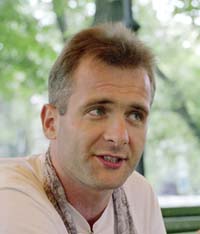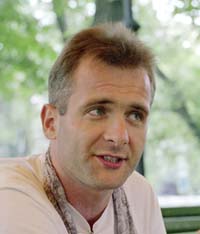March 1, 2011

The Committee to Protect Journalists is deeply concerned by reports of irregularities in the decade-long investigation into the 2000 kidnapping and murder of Internet journalist Georgy Gongadze. Particularly, CPJ is disturbed by efforts to derail progress in the investigation and peg the ultimate responsibility for the murder on a dead suspect, while other leads in the case languish. Since assuming office in March, you have publicly stated your commitment to press freedom in Ukraine. The case of Georgy Gongadze is a litmus test for you and your administration, and we urge you to ensure that none of the perpetrators of his kidnapping and killing are allowed to walk free.
A two-year-long trial of three suspected accomplices in Gongadze’s murder ended in 2008 with convictions–a significant step on the road to justice. The three men–all police officers–are currently serving lengthy prison terms for having followed, abducted, and decapitated the journalist in September 2000. In July 2009, a key suspect, Interior Ministry General Aleksei Pukach, was arrested in northeastern Ukraine. Investigating authorities dubbed Pukach Gongadze’s immediate killer. He is accused of organizing surveillance of the journalist and strangling him.
Though this progress in the case has been welcome, the issue of prosecuting the crime’s masterminds has remained unaddressed. Prosecutors have failed to investigate former and current high-ranking officials–including former President Leonid Kuchma and then-head of presidential administration and current Parliament Speaker Vladimir Litvin–who have long been suspected of being involved in Gongadze’s killing.
Kuchma and his aides have been plagued by suspicions that they directly commissioned the crime ever since audiotapes, secretly recorded by a former presidential bodyguard, surfaced two months after Gongadze’s disappearance. On those recordings, Kuchma is allegedly heard instructing late Interior Minister Yuri Kravchenko to “drive out” Gongadze and “give him to the Chechens,” according to transcripts obtained by news agencies. Both Kuchma and Litvin have denied involvement.
According to Valentina Telychenko, the lawyer for Gongadze’s widow, Myroslava, the tapes were analyzed by local and international experts, and included in the files of the investigation. It remains unclear whether the recordings will be permitted as evidence in court. They are said to carry the voices of Kuchma, Litvin, and Kravchenko. (In 2005, Kravchenko was found dead in his apartment just hours before his scheduled questioning in the Gongadze case. Authorities said he had committed suicide but doubts lingered as to how the minister had managed to shoot himself in the head twice.
In October, the local press reported that Pukach’s state-appointed defense attorney, Oleg Musiyenko, publicly stated that his client had given testimony directly implicating Kuchma and other officials in the murder. (Pukach’s testimony has not been made public.) Musiyenko was removed from the case the same month, allegedly on his client’s request, according to Ukrainian press reports.
Investigating authorities’ actions since October have been questionable and unexplained.
In early October, investigators barred Myroslava Gongadze’s lawyer, Telychenko, from accessing the case files and quietly downgraded their charges against suspected killer Pukach. In late November, investigators announced that they had completed their investigation, and prosecutors changed the case’s status from a contract killing to “a killing on verbal order”–two separate articles in Ukraine’s criminal code; the latter formulation carries a milder penalty for the convicted, according to local news reports. Telychenko told CPJ that by reclassifying the case, prosecutors effectively downgraded it, shrinking the circle of those suspected of masterminding the murder to a single individual–the dead Kravchenko.
Once the case was downgraded, prosecutors violated due process by bypassing the plaintiff’s side and handing the case files to the suspected murderer, Pukach, for review. This violation of procedure prevented Myroslava Gongadze and her lawyer from challenging the case in an informed and effective manner. The plaintiffs have to this day not received access to the case files. Nevertheless, they have filed appeals against the case’s downgrading. On January 31, the Pechersky District Court in Kyiv denied the initial appeal; a second appeal is still pending.
It is of utmost concern to Gongadze’s family, to CPJ, and all members of the Ukrainian and international press freedom community, that the hard-earned progress in this significant case is being destroyed. Our colleague Georgy Gongadze deserves justice, and that includes holding every single culprit, regardless of his rank or political standing, responsible before a court of law. The public–both in Ukraine and abroad–deserves to know the truth about what happened to him.
We urge you to use the influence of your high office to ensure that no perpetrator in this heinous crime walks free. By stopping short of prosecuting the masterminds, Ukraine will allow impunity to prevail and backpedal on its hard-earned press freedom gains since the Orange Revolution of 2004.
Thank you for your attention to this urgent matter.
Sincerely,
Executive Director
